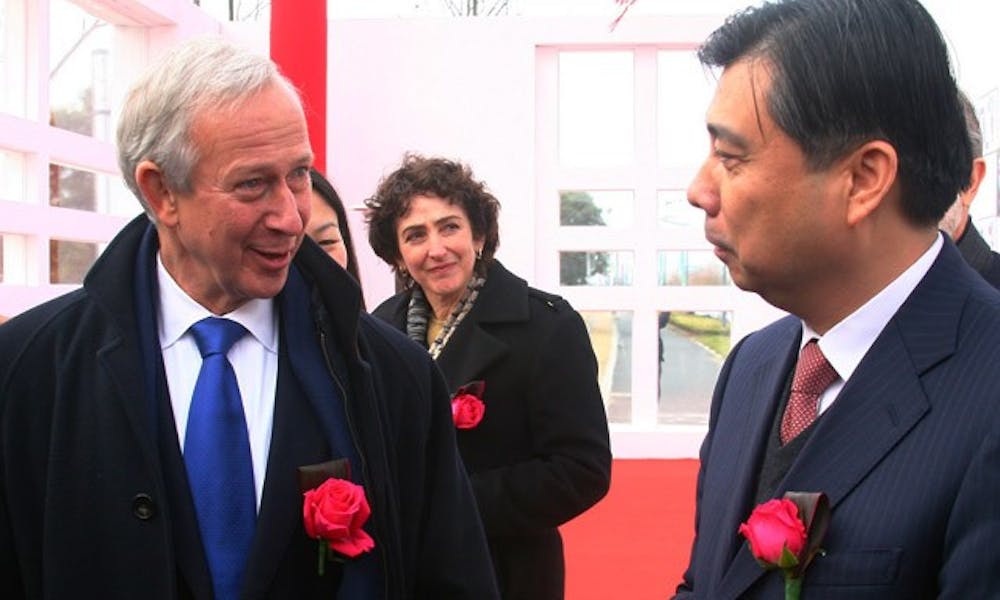University administrators capped off a week-long visit to China Friday by breaking ground at the site of Duke’s new campus in the city of Kunshan.
President Richard Brodhead, Provost Peter Lange, Dr. Sanders Williams, senior adviser for international strategy, and Blair Sheppard, dean of the Fuqua School of Business, traveled to China last week to meet with various university and government officials to formalize the partnerships between Duke, Kunshan and Shanghai Jiao Tong University. The Kunshan municipal government will provide 200 acres of land and foot the bill for the five-building teaching, research and residential facility.
“It will give Duke a very visible presence in one of the most dynamic areas of Asia,” Brodhead said in an interview Sunday. “The further advantage is that since we’ll be having Duke faculty teach there, our faculty will come to gain a better understanding of this very dynamic society, which will be a benefit to our students in Durham.”
Fuqua will be the first to use the site. It will offer executive MBA and non-degree executive education programs, a pre-experience management training master’s degree and additional Duke programs for Ph.D. students.
The graduate programs that will be conducted in Kunshan, however, are only the foundation of Duke’s plans to establish a presence in China. The first phase of a three-phase plan for Chinese expansion was approved by the Board of Trustees at its December meeting.
The University will use the facilities for the Global Semester Abroad program beginning next semester and hopes to add additional programs in the future in other disciplines, administrators said.
Brodhead and Lange also met with city officials in Shanghai to talk tentatively about developing programs in its financial district in conjunction with SJTU.
“The purpose of the visit was to make progress in pinning down our relationships—the highest priority was to sign the agreement with the city of Kunshan,” Lange said. “This is a great step for us.... We’ve always believed that if we’re going to establish this kind of presence, we wanted to do it in a meaningful way.”
Negotiations for the partnership have been in the works for more than two years, said Michael Schoenfeld, vice president for government affairs and public relations.
The opportunity to establish a partnership with Kunshan and SJTU was particularly appealing, because facilities will be built at minimal cost to the University at a time when the administration is making budget cuts in various other programs and endeavors.
“Duke is on the vanguard and on the cutting edge in establishing the model for a new education structure,” said Trustees Chair and Democratic state Sen. Dan Blue, Law ’73. “If you look at how our involvement in Kunshan will differ from the way other universities have made their presence in China and other countries—it’s a new model for educational collaboration across international borders. The increased opportunities for research, education and service are very profound and very significant.”
The appointment of Gao Xiqing, Law ’86, to the Board in June 2008 also aided the process, Brodhead said.
“When we arrived in Beijing, the first person we met was Gao,” Brodhead said. “There are many different layers of government in China, and having someone who can help us understand what’s what has been very helpful.”
Nevertheless, administrators acknowledged the risks inherent in an international expansion of this scope—in a country that defines and values academic freedom differently than in the United States, and that has also had a sometimes shaky diplomatic relationship with the U.S..
“We definitely took those risks into account and we believe the best way to come to terms with a society is to engage them in a meaningful way and to deal with any situations as they arise,” Lange said.
Brodhead noted that Duke will still be in full control of faculty appointments, curriculum and admissions for the Kunshan site.
“We’ll not abandon our beliefs in freedom of inquiry in China or anywhere,” he said. “It’s also true that when you go to work in other countries, you work in circumstances not identical to the ones at home and that’s just one of the consequence of the initial choice you face—are you going to go and learn something about the world or are you not?”
Blue also noted that the potential opportunities and benefits of the venture outweigh the risks.
“From a Board perspective, we believe the Duke partners in China are very worthy partners and are equally dedicated to this business venture,” he said. “The thing about education is—especially if you’re going to lead—you have to lead and you can’t wait for the obvious moment, until all the risks are gone.... There arguably could be some risks, they’re not substantial and they don’t pose any threat at all, certainly not to the academic freedom for Durham.”
Get The Chronicle straight to your inbox
Signup for our weekly newsletter. Cancel at any time.

